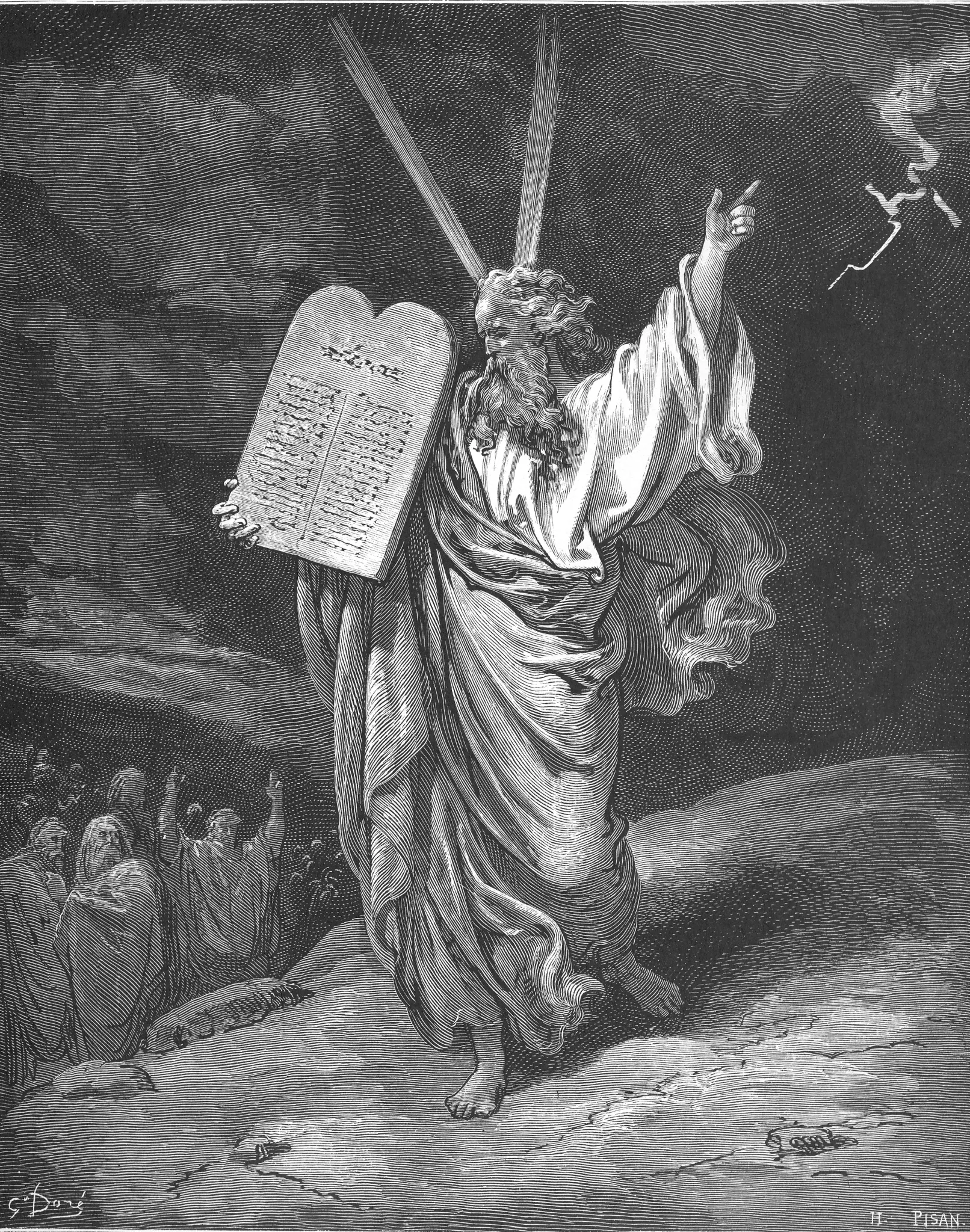Throughout the Bible, God revealed Himself to various people in different ways. One of the most intriguing figures is Moses, a prophet and a leader who, according to the Bible, experienced divine encounters that shaped his life and fate. A burning bush, a mountaintop, and a voice from heaven – these are some of the things that make Moses’ story one of the most fascinating in the religious tradition. In this article, we will explore whether Moses saw God and what implications this has for our understanding of faith and spirituality. Join us as we delve deeper into Moses’ journey of faith.
The Story of Moses in the Bible

As a central figure in the Old Testament, Moses’ journey is one that has captivated readers for centuries. Born into slavery, he was saved by Pharaoh’s daughter and raised as royalty. However, after realizing his heritage and witnessing the harsh treatment of his people, Moses fled to the wilderness. It was here that he began his journey with God, and it was through a series of prophetic experiences that he would eventually lead the Israelites out of slavery in Egypt.
-
Moses’ Call to Lead: It all began with a burning bush, an experience that Moses had while tending sheep in the wilderness. He saw a bush that was on fire, but was not consumed by the flames. As he approached, he heard the voice of God speaking to him, telling him to remove his shoes and revealing his plan for the Israelites.
-
The Plagues of Egypt: After confronting Pharaoh and demanding that he release the Israelites from slavery, Moses and his brother Aaron were met with resistance. In order to convince Pharaoh that they were sent by God, Moses performed a series of miracles, or plagues, that showed God’s power over the Egyptian gods.
-
Mount Sinai and the Ten Commandments: After finally being released from slavery, the Israelites journeyed to Mount Sinai, where they received the Ten Commandments from God. Moses acted as an intermediary between God and the Israelites, communicating God’s laws and helping them to live in accordance with His will.
-
Moses’ Relationship with Yahweh: Throughout his time as a leader, Moses had a close and intimate relationship with God. He spoke to Him directly and even pleaded with Him to spare the Israelites when they had sinned. It was this relationship that helped to guide him through the challenges of leadership, and it was his unwavering faith that allowed God to work through him.
-
The Legacy of Moses: Today, Moses is remembered as one of the greatest prophets in biblical history. His vision and leadership helped to shape the faith of the Israelites and set them on a path to fulfill God’s covenant. His example serves as an inspiration to those on their own faith journey, showing the power of divine revelation and the possibilities of a life lived in service to God.
The Burning Bush Encounter

The Burning Bush Encounter is a pivotal moment in Moses’ faith journey and one of the most well-known stories in the Bible. The story, told in Exodus 3, describes how Moses encounters a bush that is burning but not consumed by the flames. As he approaches the bush, God speaks to him and instructs him to remove his sandals because he is on holy ground.
This encounter is significant because it is the moment when God reveals his divine presence to Moses and sets him on the path to becoming the leader of the Israelites and leading them out of Egypt. It is also notable because it is one of the few times in the Bible where God reveals himself in a tangible way.
The story of the Burning Bush Encounter also highlights the importance of faith and obedience. Despite Moses’ reluctance to take on the task of leading the Israelites, he ultimately trusts in God and follows his commands. This act of faith leads to the covenant with God and the giving of the Ten Commandments on Mount Sinai.
The Burning Bush Encounter is a powerful example of how God can reveal himself to individuals in supernatural ways. It is a reminder that faith and obedience are essential components of a relationship with God, and that even when we may be hesitant or uncertain, we can trust in his plan.
Overall, the story of the Burning Bush Encounter is an important chapter in the history of Christianity and provides valuable insight into Moses’ faith journey and the nature of God’s divine revelations. It reminds us to look for the presence of God in our lives and to trust in his plan for us, even when we may not understand it fully.
Mount Sinai and the Ten Commandments
After escaping Egypt with the Israelites, Moses led them to Mount Sinai, where he received the Ten Commandments from Yahweh. This event, as recorded in the Book of Exodus in the Old Testament of the Bible, is one of the most significant moments in the faith journey of both Moses and the Israelites. Here’s a closer look at what happened:
-
The Revelation at Mount Sinai: When the Israelites reached Mount Sinai, Yahweh appeared to Moses and revealed himself as the God of their ancestors. Yahweh spoke to Moses from the mountain and gave him the Ten Commandments, which were written on stone tablets.
-
The Contents of the Ten Commandments: The Ten Commandments are ten principles which form the basis of moral and ethical behavior for Jews and Christians. The first four commandments deal with man’s relationship with God, while the remaining six are concerned with man’s relationship with his neighbor.
-
The Importance of the Ten Commandments: The Ten Commandments are significant parts of the religious beliefs of Christians and Jews as they set forth the foundation of ethical and moral behaviour for religious believers. They serve as guiding principles for personal and societal conduct.
-
The Breaking of the Tablets: While Moses was on the mountain, the Israelites, under the leadership of Aaron, worshipped a golden calf. This angered Yahweh, who ordered Moses to go down from the mountain. Upon seeing the idolatry of the Israelites, Moses threw the tablets to the ground, breaking them into pieces.
-
The Second Set of Tablets: After pleading with Yahweh, Moses was given a second set of stone tablets bearing the Ten Commandments. He took them to the Israelites and this time, they were able to follow them more closely.
The event at Mount Sinai is one of the most important moments in the Bible. It demonstrates how God revealed Himself to Moses in one of the most spectacular ways possible. Although Moses never saw God face to face, his faith journey was characterized by a deep relationship with Yahweh, the One who saw him and guided him throughout his life. The Ten Commandments, received at Mount Sinai, have been guiding principles for believers for thousands of years, and are still held in high esteem among religious leaders today.
Moses’ Relationship with Yahweh
Moses is arguably one of the most significant figures in the Bible, known for leading the Israelites out of Egypt and receiving the Ten Commandments from God on Mount Sinai. But did he actually have a personal relationship with Yahweh, the God of the Old Testament, and did he see Him face-to-face?
The Bible describes Moses as having a close relationship with God. In fact, on multiple occasions, Moses spoke directly with Yahweh and received divine revelation. One of the most famous accounts is found in the book of Exodus when Moses encounters the burning bush.
According to the passage, Moses was tending to his sheep when he sees a bush that is on fire but not burning up. As he approaches it, God calls out to him and tells him to remove his sandals because he is standing on holy ground. God then identifies Himself as the God of Abraham, Isaac, and Jacob, and reveals His plan to rescue the Israelites from slavery in Egypt.

At Mount Sinai, Moses received the Ten Commandments from God, which form the foundation of the Jewish and Christian faiths. The Bible describes the mountain as being covered in smoke and lightning, and the people could hear the voice of God speaking from the mountaintop.
Throughout his journey leading the Israelites, Moses continued to have direct communication with Yahweh. He questioned God, interceded on behalf of the Israelites, and received guidance and instruction. Biblical accounts describe Moses as being a deeply spiritual and faithful person who had a unique relationship with God.
However, there are differing interpretations of Moses’ relationship with Yahweh. Some scholars argue that the events described in the Bible should be interpreted metaphorically, rather than literally, and that Moses did not actually see or speak with God face-to-face. Others believe that Moses had supernatural experiences, such as divine visions, that allowed him to communicate with God.
Regardless of one’s interpretation, Moses’ story is a powerful example of faith and prophecy. His journey exemplifies the extraordinary lengths to which someone can go in pursuit of their religious beliefs, and his experiences with Yahweh continue to be revered by religious leaders and followers today.
Divine Revelation and Spiritual Experiences in the Bible
As you journey deeper into the story of Moses in the Bible, you can’t help but be fascinated by the supernatural experiences that he had. From his first encounter with the burning bush to the moment he received the Ten Commandments on Mount Sinai, Moses had an undeniable connection with God. In this section, we will explore the concept of divine revelation and spiritual experiences in the Bible and how they relate to Moses and his journey.
-
The Burning Bush Encounter:
Moses’ encounter with the burning bush is one of the most iconic moments in biblical history. The story goes that he was tending his flock when he came across a bush that was on fire but was not being consumed by the flames. It was at this moment that he heard the voice of God, calling him by name and revealing that he had been chosen to lead the Israelites out of bondage in Egypt. This divine revelation was the beginning of a journey that would change the course of human history. -
Mount Sinai and the Ten Commandments:
After leading the Israelites out of Egypt and through the Red Sea, Moses climbed Mount Sinai to receive the Ten Commandments from God. This was another powerful moment of divine revelation and an example of how God speaks to his people through supernatural means. The experience of hearing God’s voice and receiving the Commandments was a profound moment for Moses and the Israelites, solidifying their covenant with God. -
Moses’ Relationship with Yahweh:
Throughout his journey, Moses had a close relationship with Yahweh, the God of the Israelites. He spoke to God directly and even argued with him at times, demonstrating a level of intimacy that was rare among religious leaders of his time. Moses’ personal relationship with God is a powerful reminder that, regardless of our position or status in life, we can all have an authentic and meaningful relationship with the divine. -
Examining the Interpretations and Evidence:
There has been much debate about the validity of Moses’ experiences with God and whether they were truly supernatural in nature. Some argue that they were simply allegorical or metaphorical expressions of his faith and religious beliefs. However, there is evidence in the Bible and other religious texts that suggest that these experiences were indeed real and tangible. -
Seeking a Personal Understanding of Moses and God:
As you explore the story of Moses and his journey of faith, it’s essential to consider how it relates to your own personal journey. How do you experience divine revelation and spiritual experiences in your life? What can you learn from Moses as a religious leader and prophet? By seeking a personal understanding of Moses and God, you can deepen your faith and spiritual connection to the divine.
« Unveiling the Connection between the Pyramids and the Bible
Discover the Ultimate Bible Study Tool – The Blue Letter Bible »
In conclusion, the story of Moses is a powerful example of the role that divine revelation and spiritual experiences play in the lives of religious leaders and communities. Through his encounters with the burning bush and receiving the Ten Commandments on Mount Sinai, Moses demonstrated a profound connection with God that has inspired people for centuries. By examining his journey and seeking a personal understanding of his experiences, we can deepen our own faith and spiritual beliefs.
Examining the Interpretations and Evidence
When it comes to the question of whether Moses actually saw God in the Bible, there are varying interpretations and evidence to consider. Some scholars and religious leaders believe that Moses did have a direct encounter with God, while others view it as a more metaphorical or symbolic representation of divine revelation.
One piece of evidence that supports the idea of a literal encounter with God is the description of the burning bush in the book of Exodus. According to the text, Moses saw a bush that was on fire but did not burn up. As he approached it, he heard a voice calling out to him, which he identified as the voice of God. This encounter led to the revelation of God’s name as Yahweh and ultimately to the liberation of the Israelites from slavery in Egypt.
Another important event in the story of Moses is his journey to Mount Sinai, where he received the Ten Commandments. According to the biblical account, Moses climbed the mountain and met with God in a thick cloud of smoke and lightning bolts. This experience is often interpreted as a powerful manifestation of God’s divine presence, and it reinforces the idea that Moses had a unique and direct connection with God.

At the same time, there are alternative interpretations of these events as well. Some religious scholars argue that the burning bush should be understood as a symbol of spiritual transformation rather than a literal encounter with God. Others suggest that the story of Mount Sinai is more of a metaphorical representation of the Israelites’ covenant with God, rather than a firsthand account of a supernatural event.
Ultimately, the question of whether Moses actually saw God in the Bible is a matter of interpretation and personal faith. There is no one “right” answer or definitive proof, but instead a range of perspectives to consider. For those with a strong faith in God and the Bible, the story of Moses serves as a powerful example of divine revelation and the importance of following one’s faith journey. For others, the story may be seen as a more symbolic representation of human spiritual experiences and our ongoing pursuit of greater understanding and connection with the divine.
Seeking a Personal Understanding of Moses and God
As you delve deeper into the story of Moses in the Bible, you may find yourself questioning if he actually saw God. Through his faith journey, Moses experienced several divine revelations and supernatural occurrences that are unlike any other religious teachings. But how can we interpret and understand these experiences for ourselves?
Here are some ways you can seek a personal understanding of Moses and God:
-
Study the Biblical History
To fully grasp the significance of Moses and his relationship with God, it is important to study the biblical history surrounding his life. This includes reading the Old Testament book of Exodus, which details Moses’ journey leading the Israelites out of slavery, as well as his interactions with God. -
Seek Guidance from Religious Leaders
Religious leaders, such as your youth pastor or church leader, can provide guidance and insight into the Christian theology surrounding Moses and God. Schedule a meeting or attend a Bible study to ask questions, share your thoughts, and gain a deeper understanding. -
Reflect on Your Own Spiritual Experiences
Just like Moses had divine revelations and supernatural experiences with God, you too may have had similar occurrences in your faith journey. Reflect on these experiences and how they have shaped your religious beliefs and spiritual practices. -
Challenge Your Faith Through Questioning
It is okay to question and challenge your faith, as this can lead to a stronger understanding and personal connection with God. Ask yourself tough questions about Moses’ experiences, as well as your own, and seek answers through prayer, reflection, and open-mindedness. -
Read Religious Texts and Teachings
In addition to the Bible, there are a plethora of religious texts and teachings that can help you gain a deeper understanding of Moses and God. Take the time to read and study these texts, and reflect on how they align with your personal beliefs and experiences.
In summary, seeking a personal understanding of Moses and God is a journey that requires an open mind, reflective heart, and dedication to learning and growth. Through studying, questioning, and seeking guidance, you can develop a more meaningful and personal connection with these ancient religious leaders and their experiences with the divine.












